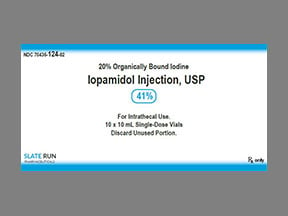
Iopamidol Coupons & Savings Card – Discount Prices from $15.15
Generic for: Isovue-m 300, Isovue-m 200
Iopamidol is a non-ionic, water-soluble contrast agent commonly used in medical imaging procedures such as CT scans and angiography to enhance the visibility of blood vessels, organs, and tissues. Its low osmolality reduces the risk of adverse reactions compared to older, high-osmolar contrast agents, making it safer for patients. After administration, iopamidol is rapidly distributed throughout the body's extracellular fluid and is primarily excreted unchanged by the kidneys within 24 hours. While generally well-tolerated, some individuals may experience side effects like nausea, headache, or allergic reactions. It's important for healthcare providers to assess a patient's medical history and kidney function before using iopamidol to ensure its safe application.
Our coupons are free to use. Before paying, show the pharmacist your Iopamidol savings card to get your free discount. Use our filters below to edit the prescription box to match your needs. The Iopamidol prices will update based on your prescription needs. Above our Iopamidol coupons, you can change your location to see pharmacy prices and costs in other areas. We're here to help you buy Iopamidol at the lowest price with our prescription discount card.
My prescription
Edit
10ML of 41%, Iopamidol (1 Vial)
Select pharmacy

CVS
$53.15
COUPON PRICE
Albertsons
$15.15
COUPON PRICE
Walmart
$29.01
COUPON PRICE
Walgreens
$40.47
COUPON PRICEIopamidol savings card
Show this card to your pharmacist
Albertsons
$15.15
BIN
ID
PCN
GRP
019876
LH5E94EFDB
CHIPPO
LHX
Powered by
Iopamidol is a non-ionic, water-soluble contrast agent commonly used in medical imaging procedures such as CT scans and angiography to enhance the visibility of blood vessels, organs, and tissues. Its low osmolality reduces the risk of adverse reactions compared to older, high-osmolar contrast agents, making it safer for patients. After administration, iopamidol is rapidly distributed throughout the body's extracellular fluid and is primarily excreted unchanged by the kidneys within 24 hours. While generally well-tolerated, some individuals may experience side effects like nausea, headache, or allergic reactions. It's important for healthcare providers to assess a patient's medical history and kidney function before using iopamidol to ensure its safe application.
Our coupons are free to use. Before paying, show the pharmacist your Iopamidol savings card to get your free discount. Use our filters below to edit the prescription box to match your needs. The Iopamidol prices will update based on your prescription needs. Above our Iopamidol coupons, you can change your location to see pharmacy prices and costs in other areas. We're here to help you buy Iopamidol at the lowest price with our prescription discount card.
Iopamidol dosage forms
Use our Iopamidol 10ML of 41% coupon with prices from $15.15 for 1 Vial. You can also use our Iopamidol 10ML of 41% coupon with prices from $22.80 for 2 Vials. We have a Iopamidol 10ML of 41% coupon with prices from $30.45 for 3 Vials. You can use our Iopamidol 15ML of 61% coupon with prices from $22.34 for 1 Vial.
Dosage Quantity Price from Per unit 10ML of 41% 1 Vial $15.15 $15.15 10ML of 41% 2 Vials $22.80 $11.40 10ML of 41% 3 Vials $30.45 $10.15 15ML of 61% 1 Vial $22.34 $22.34 15ML of 61% 2 Vials $37.18 $18.59 15ML of 61% 3 Vials $52.01 $17.34
| Dosage | Quantity | Price from | Per unit |
|---|---|---|---|
| 10ML of 41% | 1 Vial | $15.15 | $15.15 |
| 10ML of 41% | 2 Vials | $22.80 | $11.40 |
| 10ML of 41% | 3 Vials | $30.45 | $10.15 |
| 15ML of 61% | 1 Vial | $22.34 | $22.34 |
| 15ML of 61% | 2 Vials | $37.18 | $18.59 |
| 15ML of 61% | 3 Vials | $52.01 | $17.34 |
